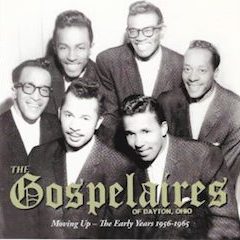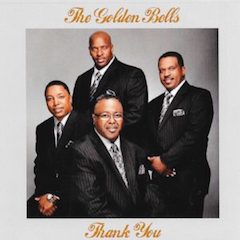

‘…one of the hardest singing quartets on the gospel highway…’
MOVING UP–THE EARLY YEARS 1956-1965
The Gospelaires of Dayton, Ohio
Gospel Friend (released: November 17, 2017)
The Gospelaires of Dayton, Ohio, were one of the hardest singing quartets on the gospel highway during the genre’s storied golden era. The quartet was part of touring packages that crisscrossed the country. They eventually made it to the stage of the Apollo Theater and across the ocean to Europe.
But as popular as the Gospelaires were, scant attention has been paid to them in the CD reissue market. It’s no surprise that Per Notini’s Gospel Friend label, the most ardent revivalist of gospel singers and groups that were yesterday’s headliners, is the first to release a commercial CD comprised entirely of Gospelaires’ singles and album tracks.
Moving Up–The Early Years 1956-1965 focuses on the first decade of the Gospelaires’ recording history. In addition to making such time-honored tracks as “Ride This Train” and “Rest for the Weary” available to the digital generation, Moving Up is the first known collection to include the Gospelaires’ rare first recording on the Texas-based Avant label: 1956’s “We Are Marching Together”/“Some People Never Stop to Pray.”
‘Ride This Train,’ The Gospelaires of Dayton, Ohio, with lead singer Bob Washington, live at the Jazz Festival in Antibes Juan-les-Pins, October 1966
‘Some People Never Stop to Pray,’ The Gospelaires of Dayton, Ohio’s rare first recording on the Texas-based Avant label, releaed in 1956 and included on Moving Up–The Early Years 1956-1965
‘We Are Marching Together,’ The Gospelaires of Dayton Ohio. B side of the group’s first Avant single with ‘Ride This Train,’ featured on Moving Up–The Early Years 1956-1965
What one hears on the Avant disc is a group still searching for its own voice distinct from then-reigning quartets such as the Violinaires, the Golden Gate Quartet and the Sensational Nightingales. They find it in the incendiary lead vocal work of Bob Washington, Paul “Easy” Arnold, and Melvin Boyd; the staff-leaping falsetto of Charles McLean; and Robert Lattimore’s rhythmic booming bass voice and stinging electric guitar accompaniment. The group waxed one superb side after another for Peacock Records, a label they would stay with for some twenty years.
Among Moving Up‘s most salient tracks—electrifying examples of the Gospelaires at their apex—are “Sit Down Children,” “He Heard Me Cry,” “I’ve Got It,” and “Trouble No More.” After listening to Washington and Arnold trade leads on “I’ll Be So Glad,” one can only imagine what it must have been like to see them live.
‘I’ve Got It,’ The Gospelaires of Dayton, Ohio, released on Peacock Records, featured on Moving Up–The Early Years 1956-1965
The album notes, written by yours truly, represent the first extended history of the group. Compiled primarily from interviews and contemporaneous newspaper articles, the essay traces the Gospelaires’ origins from Dayton’s Edgemont area, a destination for southern migrants moving north to work in the burgeoning manufacturing sector, to its shift to Miami, where the current iteration is led by longtime member Bill Allen.
Moving Up demonstrates why the Gospelaires grew beyond the confines of Dayton, Ohio, to become one of the nation’s top quartets of the late 1950s and 1960s.
Picks: “Some People Never Stop to Pray,” “Ride This Train”
***

‘…refashioning traditional gospel staples into the modern quartet style…’
THANK YOU
The Golden Bells
Much of Thank You, the latest full-length CD release by the Golden Bells of Lexington, Mississippi, is a refashioning of traditional gospel staples into the modern quartet style.
Even when the songs are newly-composed and the music meets today’s gospel quartet standards, they retain the old church character in their lyric content. For example, on “Say Something Good,” the Golden Bells prefer to turn the other cheek to their haters, but by reviving some of grandma’s well-worn words of wisdom (“What goes around comes back again”), the group confirms the wisdom of their decision while knowing that haters will get theirs in the end.
The congregational singalong “What a Time,” as well as “Stop by Here” and Kenneth Morris’s classic “Jesus Is Real” will ring familiar with the listener, even though the quartetters go out of their way to make the songs their own. The oral tradition of handing down church songs from one generation to another is clearly at work on Thank You.
‘Thank You,’ The Golden Bells, title track from the new album
Ending the album on a note of introspective humility: ‘Nobody’s Fault,’ The Golden Bells, from Thank You
The album’s drive-tempo songs are its best. The Golden Bells work hardest on “Lay Down My Burdens,” a revamp of “Down by the Riverside,” though “Work On Me,” a personal plea to God to help us be better people, also moves with maximum thrust due to impassioned singing and an unrelenting gospel quartet backbeat.
Rather than end on the high note set by “Lay Down My Burdens,” Dr. Isaac Lindsey and the Golden Bells prefer to conclude the album in a tone of introspective humility on “Nobody’s Fault.” None of the finger pointing and blaming that all but consumes society today. “If I don’t make it in [Heaven],” the group sings, “it’s nobody’s fault but mine.” In other, though less eloquent, words, despite the opportunities available for God to “work on me,” free will gives us the ultimate power to decide our own fate.
Picks: “Lay Down My Burdens,” “Work On Me.”
***

‘…demonstrates the power of sacred music to make the wounded whole…’
SIMPLY CHERYL
Cheryl Fortune
LuDawn Music/Tyscot Records
(Released: October 13, 2017)
On a selection from her album Simply Cheryl, gospel singer-songwriter Cheryl Fortune sings: “You don’t know the half of it, and I just can’t tell it all.”
Cheryl, a background vocalist for Kirk Franklin and the wife of gospel artist James Fortune until their marriage dissolved over his domestic abuse, may not tell it all but we get the drift. The album’s coded references to her recent personal history are exactly what we would have expected from this, her debut solo album. Anything else would have been disingenuous (James is not even mentioned in the liner notes).
But if the message remains the same throughout the album, the music doesn’t. The singer tees up the first half with a brief introductory gush over her love of the music of the 1980s and 1990s and how she wanted to bring that groove into her album. And she does: the polyrhythmic funk of “4 a Night” encircles a lyric of encouragement and hope. “Don’t Apologize” is the latest addition to the “you are beautiful” canon, although Cheryl supplements the typical I-don’t-look-like-what-I’ve-been-through declaration with an I-don’t-know-how-she-does-it amazement.
‘Fighters,’ official video for ‘one of the best gospel singles of the year,’ by Cheryl Fortune, from Simply Cheryl
‘Cheryl at her emotional apex’: ‘Give It Up,’ Cheryl Fortune, from Simply Cheryl
“Fighters,” one of the best gospel singles of the year, is a fellow traveler’s anthem of hope for the hopeless. Its Kirk-style melody and bite-size lyrics, high school marching band beat and children’s choir fuel a message of empowerment to abuse survivors. Cheryl adds her #metoo at the tail end. Indeed, “Fighters” could well have been the title of this album.
The album gets darker and more dramatic after the second spoken interlude. This half also provides Cheryl with greater space for extended vocal expression. If “Lost in the Crowd” opens the door to a more confessional mood, “Truth Is” walks through it. Being on stage was an excellent metaphor for her reality, Cheryl sings, because the stage is about make believe. It gave her the forum to make it appear as if everything in her life was okay when it was not.
“Give it Up” finds Cheryl at her emotional apex, soulfully delivering her new philosophy of life with unflinching honesty. While coming to the same conclusion as James Cleveland and the Cleveland Singers’ 1964 ballad “That Will Be Good Enough for Me,” Cheryl reverses the phrases around the conjunctions. Where Cleveland has “never been to Paris,” Cheryl has traveled to the top of mountains. She has enjoyed the trappings of the wealth Cleveland can only dream about (in the song, anyway). Nevertheless, both come to realize that money and fame have no value compared to the love of Jesus.
Simply Cheryl is a notable debut and demonstrates the power of sacred music to make the wounded whole.
Picks: “Fighters,” “Give It Up.”
***

‘…catchy with its music, persuasive with its message…’
RECONCILED
J Kingdom
Reshift Music Group
J Kingdom’s new album Reconciled bristles with bright, optimistic melodies and lyrics of unfettered praise and gratitude to God for everything He has done, even when we don’t deserve it.
J Kingdom, aka Pastor Michael J. T. Fisher of Greater Zion Baptist Church in Compton, California, introduces the “don’t deserve it” part of the equation at the outset, during the opening supplication, “Keep Your Hand on Me.” He brings it up time and again throughout the album. It’s the human struggle to follow the right path but erring along the way. It all comes down, J Kingdom sings, to reconciliation: “You got a choice to make/Make it the right one.”
With blasts of hooky, EDM-filled melody, the album presents a convincing case for making the right choice. J Kingdom celebrates God’s favor on “Amazing,” because He “helped my mama pay the rent,” “got my cousin that job” and made “granny all better.” “Dance (When I Think About Jesus)” is one great big gush of happiness for salvation.
‘You can look at me and tell I want the change’: ‘Complete Deliverance,’ J Kingdom, from Reconciled
‘Keep Your Hand on Me,’ J Kingdom, from Reconciled
On the other hand, the frank “Complete Deliverance” focuses on the sobering work it takes to eliminate a dual lifestyle, especially when sin is “in our pores”: “We say we want to put it all at the altar, but we never tell Him what it is.” To this, J Kingdom adds, “I don’t want to preach another sermon after shooting up.” Whoa.
There’s an awful lot of love that comes with discipleship, J Kingdom concludes on “Wanna Be Close,” his 2014 single that is included on the album, if we but embrace it.
For an independently produced CD, with liner notes that could use more details on who played on what song, Reconciled is surprisingly catchy with its music and persuasive with its message.
Pick: “Complete Deliverance”
***

‘…a clear understanding of how to work a gospel song…’
I GOT YOU
Ruth La’Ontra
ALJR Music Group/Tyscot Records
(released: September 22, 2017)
To the best of my recollection, the last time a Ruth Jones was in gospel music, she was a teenager singing with Sallie Martin. Finding it difficult to keep boy-crazy Ruth in check, Sallie returned her to her mother. Ruth later resurfaced as a solo artist, better known as the Queen of the Blues Dinah Washington.
The new Ruth Jones goes by Ruth La’Ontra. on I Got You, the live follow-up to her debut release, So Good. Ruth showcases an instantly appealing gospel voice that improvises within artistic limits, does not over-modulate and speaks directly to listeners’ hearts rather than trying to dazzle them with histrionics.
Recorded in Durham, North Carolina, I Got You has a cheery, optimistic feel from the first note to the last. It combines pop-flavored songs, most written by the Grammy-nominated and Stellar Award-winning artist and producer Anthony Brown, with a couple of golden oldies for good measure.
‘In My Name,’ Ruth La’Ontra, covering the Thompson Communiity Singers’ 1992 hit, from I Got You
Carrying on the family tradition: Ruth La’Ontra’s version of the 19th century hymn, ‘Tis So Sweet,’ from I Got You
The oldies stand to reason; Ruth is the daughter of veteran radio announcer and North Carolina Gospel Announcers Guild president Pastor Arvetra Jones Jr. She’s the granddaughter of the late gospel singer Arvetra Jones Sr. So when she beautifully sings “Tis So Sweet,” accompanied only by organ, she’s carrying on the family tradition (the liner notes accidentally attribute the song to Brown and Jones, when it should have credited them for the arrangement, since the song is a nineteenth-century hymn).
Of the more contemporary work, “Come Through” stands out for its lovely melody, lush harmonies, and Ruth’s reassurance that God is always on time. The title track is a snappy, pop-flavored song of gratitude to God with plenty of hooks to satisfy Millennial ears. “Kingdom,” the single, is a refreshing song about service in the service of the Lord. “Reign” seems little more than a gospelized vamp on the “Hallelujah Chorus” from Handel’s Messiah.
An album sleeper is Ruth’s marvelous cover of the Thompson Community Singers’ 1992 hit “In My Name.” She echoes Kim McFarland’s original solo as the background vocalists update the song without taking away one ounce of the original flavor.
I Got You is an extremely well put together debut for an artist whose blend of gospel, pop, and jazz complements a clear understanding of how to work a gospel song. Let’s hope this Ruth Jones sticks around.
Picks: “Come Through,” “In My Name.”
***

‘…despite moments of despair, they never lose hope…’
JESUS WIND
Imari Tones
(released: November 7, 2017)
https://imaritones.bandcamp.com/album/jesus-wind
If you are not familiar with the Imari Tones, they are a Christian heavy metal band from Japan. Their latest release, Jesus Wind, is a concept album about the development of Christianity in Japan, a largely Buddhist nation.
Although I listened to heavy metal in my youth, I never paid much attention to the lyrics, so it took some acclimation for me to get to the kernel of the message on Jesus Wind (the lyrics are, with rare exception, in English).
What I distill from Jesus Wind is this: the group weaves Japanese history with dystopian images of history repeating itself in today’s Japan and around the world. God’s children were “orphans” in the Japan of the past, and God’s children might feel like orphans today, in the wake of global wrongdoing. Nevertheless, the Imari Tones urge the people to continue to fight fearlessly for freedom and save their nation/world from sin. “Don’t Stop Walking” is an all-out call for endurance in the name of Christ.
‘Saints Seeking Salvation,’ Imani Tones, from Jesus Wind
‘Remembrance,’ an acoustic instrumental by Imani Tones, from Jesus Wind
‘fight for it, fight for justice, fight for me’: ‘The War,’ Imani Tones, from Jesus Wind
These guys rock harder and faster than even Stryper. Their earnestness is palpable. They use heavy metal excess—growling guitars, ringing power chords, rapid electric guitar solos, animated drumming, pounding bass, off-the-stave falsetto shouting, a lead singer who affects a Gene Simmons-like growl and shifting time signatures—to underscore the urgency of their message and express the anxiety of the times. The sonic assault begins at measure one, with the opening song, “Jee-You,” and does not diminish, with the notable exception of “Remembrance,” a touching acoustic instrumental.
By the end of the musical journey, the Imari Tones urge everyone to “remove the chains around your neck” and seek salvation. At the same time, they despair in “The War” that the nation may not be able to be saved, but yet they will “fight for it, fight for justice, fight for me.” That line is the most poignant in the entire album.
The Imari Tones call Jesus Wind “the heaviest, most intense heavy metal album” it has ever made. No doubt about that. And while they may have moments of despair, they never lose hope.
Picks: “Remembrance,” “Jee-You”
***

‘…what the world needs now is love…’
AGAPE * EROS
Javon Inman
Liberty Music (released November 10, 2017)
Javon Inman ladles an ample serving of amor into Agape * Eros, a 40-minute musical journey into the realms of spiritual and human love.
Agape * Eros reminds me of Fred Hammond’s 2012 offering God, Love & Romance. If Hammond’s release was a tad controversial at the time (truthfully, though, there’s been tension between agape and eros in gospel music for a while), combining sacred and human love on one album is all but de rigueur today.
All but one of the opening tracks on Inman’s latest release are light melodic praise songs, sweetly sung. The one exception is the extroverted opener, “Te Amo,” with its Latin beat, explosions of electronica and lyrics en Espanol. The single, “Love Covers,” which features Music Society, is a pretty ballad that riffs on 1 Peter 4:8, which is also the premise of “Te Amo:” God’s love covers all of our sins, turning “ashes to beauty.”
‘Love Covers,’ Javon Inman with guests Music Society, from Agape * Eros
‘I Still Love You,’ Javon Inman with Michelle Carter-Williams, from Agape * Eros
To make sure nobody mistakes his intentions, Inman takes a few minutes halfway through the album to explain his purpose. After distinguishing between agape love (compassionate, sacrificial) and eros love (passionate, romantic), Inman argues that there is no real separation between the two because God, “the author of romance,” gives us both.
This introduction leads to a series of songs about love between two people. The quiet storm-y “I Still Love You,” features Inman and Michelle Carter-Williams duetting as a couple in love with one another, despite the many annoying things the other does. On “Beautiful Girl,” Inman channels Prince by wrapping his passionately fierce falsetto around love lyrics and an interesting melody.
With so many guest vocalists, the CD could be credited to Javon Inman & His Family and Friends. In addition to the soloists mentioned above, Inman features his children Christian and Isaiah on “Revelation Song,” a piece that gives the New Jerusalem passages of Revelation an appropriately anticipatory feeling. Alkeisha Williams assists on “Spectacular Journey,” a lovely pop song with sonnet-like lyrics and the most wedding-ready of the lot. Lizette Colon raises the temperature on “Te Amo.”
The sound quality of Agape * Eros is top-shelf, thanks to the production talents of Clifford R. Flowers Jr., Allyn Johnson, Lorenzo Johnson, Tone Jonez and Inman himself; and mixing and mastering courtesy of Studio 51–Brad Baerwald.
Whether or not you agree with Javon Inman’s purpose for the album, his point is well taken: if there’s one thing we need more of, it’s love—of any kind.
Picks: “Love Covers,” “Spectacular Journey”

Bob Marovich is a gospel music historian, radio announcer and author. His “Gospel Memories” radio program of vintage black gospel music and artist interviews airs live first Sundays from 3 a.m. to 7:30 a.m. on Chicago’s WLUW 88.7 FM, and streams live at the station’s website. Snippets of recent broadcasts can be heard online at the Gospel Memories Radio Show. Bob is also the founder and editor of The Black Gospel Blog, now the Journal of Gospel Music, the source for the reviews published here. Bob launched JGM on the tenth anniversary of The Black Gospel Blog, which he founded July 28, 2004, as the first blog to cover African American gospel music. His first book, A City Called Heaven: Chicago and The Birth of Gospel Music, published in April 2015 by the University of Illinois Press as part of its Music in American Life Series, was awarded the Certificate of Merit for Best Historical Research in Recorded Blues, Gospel, Soul, or R&B, Association for Recorded Sound Collections (ARSC), 2016. Bob lives in Chicago with his wife, author Laurel Delaney, and their two cats.




















